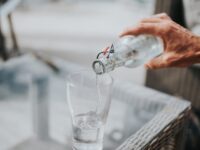Summer fun often includes beach time, golfing, and more outdoor outings. Here in Florida, we’re fortunate to have weather that lets us get outdoors year-round. However, one downside is the Florida heat and humidity. If you’re not careful about drinking enough water in hot weather, it can lead to dehydration. For older adults, dehydration is more than just feeling thirsty. It could cause more serious health problems.
We all have had the sensation of feeling thirsty after spending time outside in the heat or after doing exercise, but there are a few reasons why dehydration becomes a bigger problem for seniors:
- Our sense of thirst decreases with age.
- The use of certain medications may require a person to drink even more water or monitor how long they are exposed to the heat. This is true even for common medications, such as beta-blockers (used for blood pressure and heart rate control) and diuretics, according to the American Heart Association.
- Signs of dehydration such as muscle cramps or dizziness may be mistaken for medication side effects or aging in general.
- Cognitive impairment may lead someone to ignore the signs of feeling thirsty.
The symptoms of dehydration in older adults include:
- Feeling lightheaded or dizzy.
- Feeling fatigued or confusion.
- Urinating less frequently.
- Having darker colored urine.
Make sure to contact a doctor or seek medical care if the older adult you care for has any of these symptoms:
- Is disoriented.
- Is not able to hold down food or liquids.
- Has bloody or black stools.
- Has nausea or diarrhea for more than 24 hours.
Dehydration can lead to hospitalization and even death in extreme cases. Here is more information about heat exhaustion and heat stroke from Johns Hopkins.
How to Ensure Older Adults Are Adequately Hydrated
To help avoid the risks of dehydration, here are a few tips to keep the older adults in your life comfortable and adequately hydrated.
- Have them set reminders to drink water. Use your senior loved one’s phone or another electronic device to set reminders to drink water throughout the day.
- Limit sun exposure. The sun is strongest between 10 am and 2 pm. Encourage your loved one to minimize sun exposure during those peak hours.
- Find good food sources for hydration. This can include broths, jellies, yogurt, and fruits like watermelon and cucumbers.
- Look beyond plain water. Drinking plain water all the time may get boring, so consider adding cucumber slices, strawberry slices, or small splashes of juice to water to help add some flavor. While drinks like juice can add to your loved one’s hydration, they also can add additional sugar and calories. That’s why sticking with water is typically the healthiest approach.
- Double-check with your loved one’s doctor how much water he or she should have each day.Make sure the doctor considers any medications used that can change hydration needs.
- Buy a reusable water bottle for your senior loved one so they can easily use it throughout the day.
Call Secure Aging to Find Out How We Can Help Seniors With Care Management
At Secure Aging in Bradenton, we transform the weight of the world into a sigh of relief for our senior clients and their concerned family members. The mission of Secure Aging is to protect and preserve our client’s independence and dignity through careful and thoughtful financial and care management. As our clients age, it is their desire to remain independent and age with dignity. Our services protect our clients from talented con artists looking to exploit and deplete the financial resources of our vulnerable seniors. Secure Aging helps families in Manatee County and Sarasota County and in and around the communities of Anna Maria, Bradenton, Bradenton Beach, Ellenton, Holmes Beach, Lakewood Ranch, Longboat Key, Myakka City, Palmetto, Parrish, and Sarasota. Call us at 941-761-9338, or visit us online at www.secureaging.com.




Comments are closed